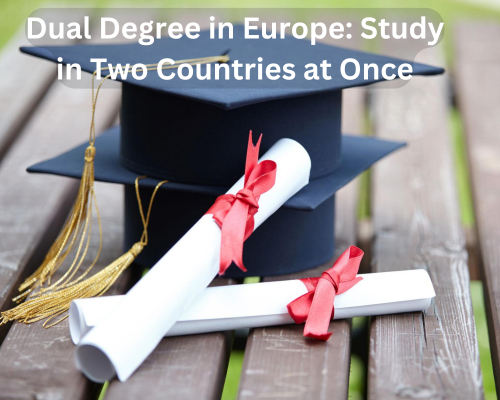
Pursuing higher education abroad is a transformative experience, and dual degree programs in Europe take it a step further by offering students the opportunity to study in two countries within the same program. These programs not only enhance academic knowledge but also provide a multicultural experience, broader career prospects, and a competitive edge in the global job market.
This article explores the structure of dual degree programs, their benefits, popular destinations, and how to apply.
What Are Dual Degree Programs?
Dual Degree in Europe, often referred to as joint or double degree programs, allow students to earn two degrees from partner universities in different countries. These programs are typically offered in collaboration between universities and often span related disciplines. For example, a business student may study international management in one country and global economics in another.
Students usually split their academic journey between two institutions, spending one to two years in each. Upon successful completion, they graduate with two recognized degrees or a single degree jointly awarded by both institutions.
Benefits of Dual Degree Programs
Multicultural Exposure: Studying in two different countries allows students to immerse themselves in distinct cultures, languages, and academic environments.This experience cultivates adaptability, enhances cultural awareness, and nurtures a global perspective.
Enhanced Career Opportunities: Graduates of Dual Degree in Europe stand out in the job market due to their international exposure and diverse skill sets. Employers often value candidates with cross-border education and a deeper understanding of global trends.
Diverse Learning Perspectives: Each university brings its unique teaching methodologies, resources, and research opportunities. Students benefit from access to world-class faculty, industry connections, and specialized curricula tailored to their fields.
Networking Potential: Dual Degree in Europe offer students the chance to build professional networks in two countries, opening doors to global career opportunities and collaborations.
Fields of Study
Dual degree programs are offered across a wide range of disciplines, such as:
Business and Management: Programs often combine international business studies with global economics or entrepreneurship.
Engineering and Technology: Students can specialize in fields like renewable energy, robotics, or information technology.
Law and Governance: Many programs focus on international law, human rights, or public policy.
Arts and Humanities: Dual programs in literature, cultural studies, and languages are widely offered.
Application Process
The application process for dual degree programs is generally more involved than for single-degree programs, as it requires meeting the admission criteria for both universities. Key steps include:
Research: Identify programs that align with your academic and career goals.
Eligibility: Ensure you meet the academic and language requirements for both institutions.
Application: Submit your application to the coordinating university, which often manages admissions for both institutions.
Interviews or Tests: Some programs may require an entrance exam or interview.
Documentation: Provide transcripts, letters of recommendation, a statement of purpose, and proof of language proficiency.
Scholarships and Funding:
Many universities and governments offer scholarships specifically for dual degree students.
Examples include:
Erasmus Mundus Joint Master Degrees: Comprehensive scholarships covering expenses for collaborative programs across Europe.
DAAD Scholarships: Funding for German-based programs, including dual degrees.
Individual University Grants: Many partner universities provide financial support for deserving students.
Additionally, students can explore tuition waivers, travel grants, and work-study opportunities to offset costs.
International dual degree programs in Europe offer a unique opportunity to gain world-class education, broaden cultural horizons, and enhance professional prospects. By studying in two countries, students acquire diverse skills, build global networks, and develop a deeper understanding of their field.
For ambitious students seeking an international edge in their education and careers, International dual degree programs in Europe might just be the perfect choice.